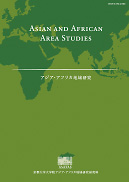Current issue
Displaying 1-6 of 6 articles from this issue
- |<
- <
- 1
- >
- >|
Articles
-
2024 Volume 23 Issue 2 Pages 177-212
Published: March 31, 2024
Released on J-STAGE: April 09, 2024
Download PDF (3363K) -
2024 Volume 23 Issue 2 Pages 213-259
Published: March 31, 2024
Released on J-STAGE: April 09, 2024
Download PDF (3746K)
Research Notes
-
2024 Volume 23 Issue 2 Pages 260-276
Published: March 31, 2024
Released on J-STAGE: April 09, 2024
Download PDF (835K) -
2024 Volume 23 Issue 2 Pages 277-292
Published: March 31, 2024
Released on J-STAGE: April 09, 2024
Download PDF (904K)
Book Reviews
-
2024 Volume 23 Issue 2 Pages 293-311
Published: March 31, 2024
Released on J-STAGE: April 09, 2024
Download PDF (938K)
Fieldwork News
-
2024 Volume 23 Issue 2 Pages 312-336
Published: March 31, 2024
Released on J-STAGE: April 09, 2024
Download PDF (6942K)
- |<
- <
- 1
- >
- >|
